Why Africa has to worry about melting Greenland ice

Equi glacier discharging into the sea off Greeenland (Pic. I.Quaile)
Working for an international broadcaster which has Africa as one of its key target groups, I often find it difficult to interest some of my colleagues in what is happening in the Arctic. So my attention was caught instantly when I came across an article by Chelsea Harvey in the Washington Post: A climate chain reaction: Major Greenland melting could devastate crops in Africa.
![]() read more
read more
Trump’s alternative reality? No warming, cool oceans, intact coral

Melting or not? (I.Quaile, Greenland)
“Irene, have you heard the news? Looks like Trump has pulled out of the Paris Agreement.” While the US President kept the suspense up until Thursday night – has he, hasn’t he, will he, won’t he -I struggled to reconcile his action with what I was hearing from a wide spectrum of highly intelligent people with decades of research and experience to their credit.
I was in Kiel this week, on Germany’s Baltic coast, attending a working meeting of the scientists involved in BIOACID, a national German programme (supported by the BMBF, Federal Ministry of Education and Research) to investigate the “Biological Impacts of Ocean Acidification”. It has almost run its course, eight years of research in the bag.
And what I was hearing did nothing to allay my concern about the impacts of our greenhouse gas emissions. We are rapidly and undeniably changing the planet we live on – land and sea. And that applies particularly to the Arctic.

GEOMAR’s research vessel Alkor in Kiel getting ready for her next trip (Pic:.I.Quaile)
The scientific evidence
Can President Trump really fail to see the dangers of our human interference? Is he really oblivious to what climate change is doing to the ocean that covers 70 percent of the surface of our planet?
Maybe he lives in a parallel universe, where alternative facts prevail.
Back in 2010, I was able to witness the work of some of the scientists assembled in Kiel this week at first hand, as they lowered mesocosms, a kind of giant test tubes, into the Arctic Ocean off the coast of Svalbard. The aim was to find out how the life forms in the water would react to increasing acidification of their environment, as our greenhouse gas emissions result in more and more CO2 being absorbed into the ocean.
Drawing the threads together

Ulf Riebesell with team members deploying experiments at Svalbard (Pic.I.Quaile)
Ulf Riebesell is Professor of Professor of Biological Oceanography at, GEOMAR, the Helmholtz Centre for Ocean Research in Kiel, and the coordinator of BIOACID.
When I first met him, he was kitted out in survival gear, supervising the transport and deployment of the mesocosms from Germany up to the Svalbard archipelago. He doesn’t need the cold-weather gear this week, in a summery Kiel, where he gathered representatives of the different working groups involved in the German project to draw some threads together as the project approaches its conclusion in November.
Good timing. The results will be ready to hand to the delegates attending this year’s UN climate extravaganza, COP23, in Bonn. Another key piece in the jigsaw puzzle of how climate change is affecting the world we live in and will determine the future of coming generations.
All creatures great and small
The scientists assembled represent a wide range of expertise. From the tiniest of microbes through algae, corals, fish and the myriad organisms that live in our seas- they have been trying to find out what happens when living conditions change for our fellow planetary residents – and how all this affects an ever-increasing population of humans and the complex societies we live in.
The ocean is changing at an unprecedented rate. It is becoming warmer, even in the depths, and it is becoming more acidic.
The work of Riebesell and his colleagues has shown that in our rapidly warming world, the CO2 that goes into the ocean is reducing the amount of calcium carbonate in the sea water, making life very difficult for sea creatures that use it to form their skeletons or shells. This will affect coral, mussels, snails, sea urchins, starfish as well as fish and other organisms. Some of these species will simply not be able to compete with others in the ocean of the future.

Cold water coral in the GEOMAR lab in Kiel. (Pic.I.Quaile, thanks to Janina Büscher)
The Arctic predicament
Acidification is not something that affects all regions and species equally. Once again, the Arctic is getting the worst of it. Cold water absorbs CO2 faster. Experiments in the Arctic indicate that the sea water there could become corrosive within a few decades, as Ulf Riebesell has told me on several occasions since I first met him on Svalbard in 2010. “That means the shells and skeletons of some sea creatures would simply dissolve.”
Scientists warn that a combination of acidification, warming and stressors like pollution of all sorts will ultimately affect the food chain. (Indeed that is already happening).
Warming as usual?
While the BIOACID project comes to an end and the scientists fight for new funding to carry on research into ocean acidification, which requires a combination of field-work and modelling, the world continues on course for far more than the two degrees – or 1,5 set out in the Paris Agreement.
“Ocean Warning” was the cover title on the Economist magazine this week, ahead of next week’s UN Oceans Conference in New York.
“The Paris Agreement is the single best hope for protecting the ocean and its resources”, the magazine reads. But it stresses: “the limits agreed on in Paris will not prevent sea levels from rising and corals from bleaching. Indeed, unless they are drastically strengthened, both problems risk getting much worse. Mankind is increasingly able to see the damage it is doing to the ocean. Whether it can stop it is another question”.

Seaweed and algae in experimental tanks at GEOMAR, Kiel (Pic.I.Quaile)
Bending the truth?
At the meeting in Kiel, I asked Professor Hans-Otto Pörtner, the other coordinator of BIOACID, senior scientist at the Alfred Wegener Institute and co-chair of the IPCC Working Group 2 for his view of the current situation, with US President Trump getting set to leave the Paris Agreement:
“Climate change is clearly human made, responsible leadership means that this cannot simply be denied or ignored. I think this is a call for better education and information of the public so that it cannot be misled by bending the truth – and this is what it comes down to. As the last report of the Intergovernmental Panel on Climate Change (IPCC) put it: “Without additional mitigation efforts beyond those in place today, and even with adaptation, warming by the end of the 21st century will lead to very high risk of severe, widespread and irreversible impacts”. In its previous analysis of decision-making to limit climate change and its effects, the IPCC also noted that climate change is a problem of the commons, requiring collective action at the global scale. Effective mitigation will not be achieved if individual agents advance their own interests independently.”
Call to action
Indeed. We are all in this together.
But there is not only bad news:
“It remains to be seen to what extent U.S. emissions will be driven by federal policy, or actions at the State and city level, or by market and technological changes”, Professor Pörtner told me.
There is, it seems to me, an upside to President Trump’s decision to live in his own alternative reality. It galvanizes those of us who live in the real world to make sure climate action goes ahead. China and the EU closed ranks this week. States, companies, civil societies and committed individuals across the USA are stressing they will press on with the green energy revolution regardless.
In the interests of the icy north – and the rest of the planet it influences so considerably – we really have no choice.

The mesocosms are used to research the effects of acidification on ocean-dwellers. (I.Quaile, Svalbard)
LISTEN:
Living Planet: STAND UP FOR THE PLANET
Living Planet: UN TALKS IN TRUMP’S SHADOW
READ:
LEAVING PARIS AGREEMENT A BREACH OF HUMAN RIGHTS?
Deciding Arctic future in Fairbanks and Bonn
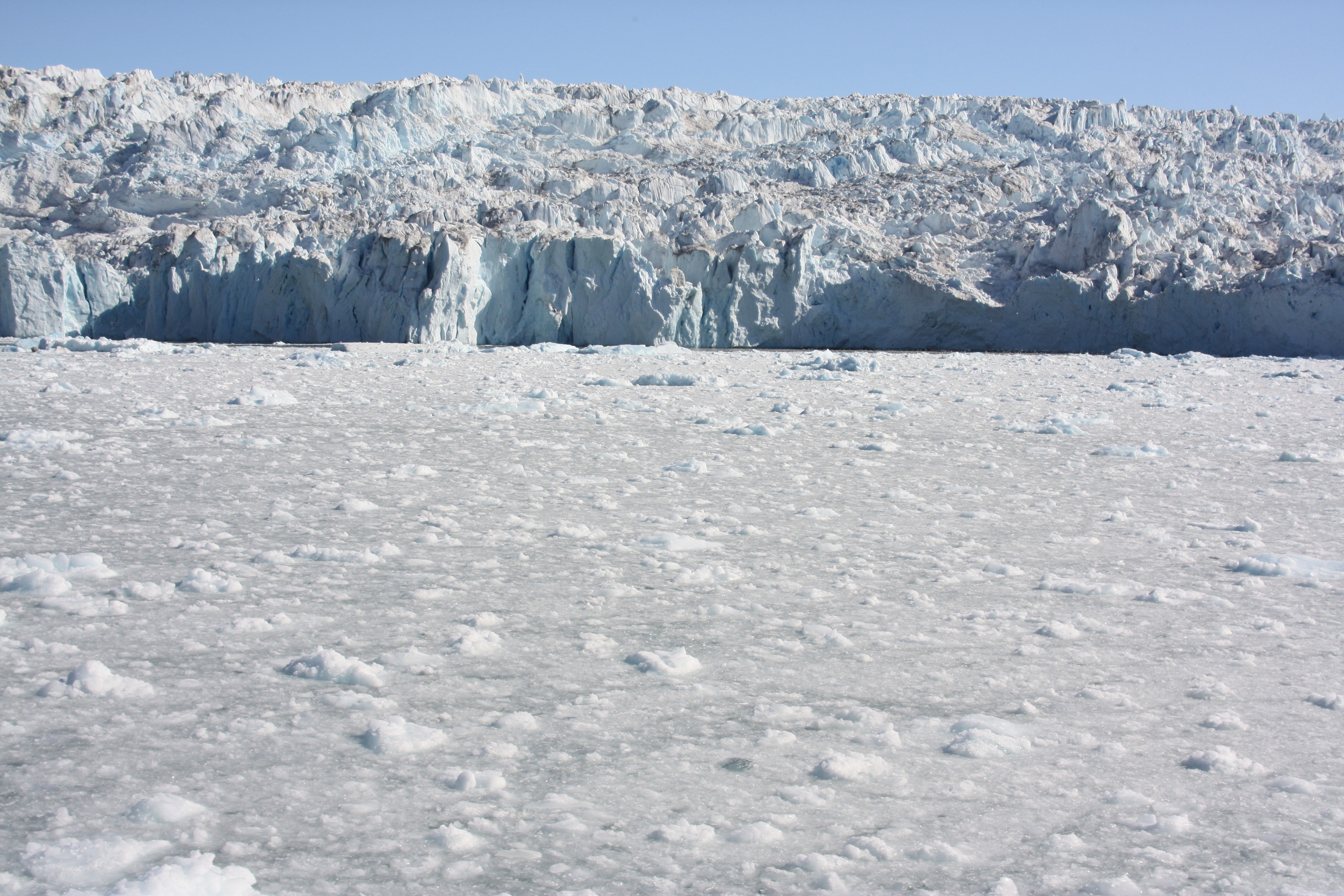
Can summits and negotiations halt Arctic melt?. (Pic: I.Quaile, Greenland)
It is hard to tell where the most influential conversations on the future of the Arctic are being held right now. Fairbanks would be the one where “Arctic” features most directly, at the summit of the Arctic Council. But the UN climate talks are also happening here in Bonn at the moment, and what was originally planned to be a fairly technical working meeting on implementing the Paris Agreement has been overshadowed by the question of whether the world’s second-biggest greenhouse gas emitter the USA might leave that Agreement, as threatened by President Trump.
The US climate question-mark
Either way, on both stages, the USA is at the centre of things. The election of Donald Trump and the establishing of an administration set on dismantling environmental protection and climate legislation has increased the size of the question mark hanging over the Paris goal of limiting global temperature rise to the two degrees – or rather 1.5 degrees – experts consider the absolute maximum to avoid dramatic feedback effects and potentially catastrophic climate change. And as far as the Arctic is concerned, even that would be too high. The icy north is already melting rapidly.
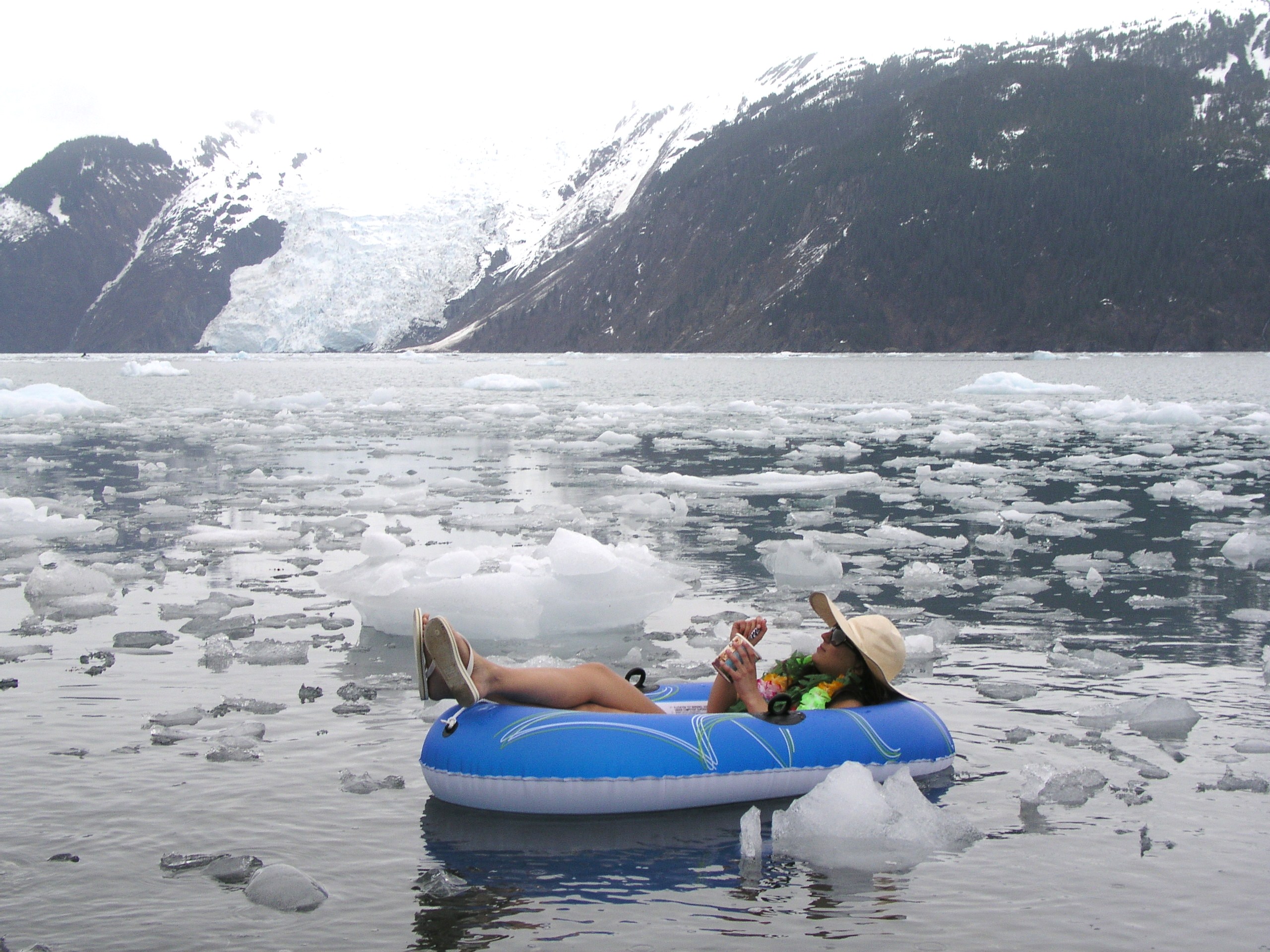
Soon no longer just fiction? (I.Quaile, Alaska)
When the talks started in Bonn on Monday, a preparatory meeting for this year’s climate mega-event, also to be held here this November at the headquarters of the UNFCCC, people were anxiously awaiting a meeting that was still scheduled to take place in the USA on Tuesday, when the President was to make the decision on the Paris Agreement. It has since been postponed. The fact that it has been rescheduled until after the G7 meeting later this month, which will be attended by President Trump, supports the view that there is more to this than just a collision of appointments. Paula Caballero, the Global Director of the Climate Program at the World Resources Institute WRI, is in Bonn for the talks, and she told me in an interview the US Cabinet is divided on this issue and President Trump still has to make up his mind. She is hopeful that good (business) sense will prevail and President Trump will be influenced by those – in his immediate surroundings and on the international stage – who point out it makes sense from all points of view to stay in that Agreement and promote the shift to renewable energies and emissions reductions. Will the G7 meeting convince Trump to stay in the Paris Agreement?
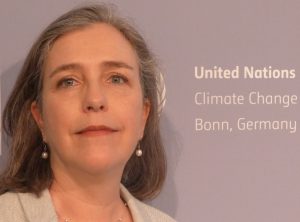
Caballero says it’s in everybody’s interests for the US to stick with Paris. (Pic. I.Quaile, Bonn)
Energy revolution from the bottom up?
You can read that interview, in which Ms Caballero outlines the ins- and outs of the US-Paris Agreement decision and stresses why it is in everybody’s interests for the US to stay in – on the DW website, or listen to it in the latest edition of Living Planet. One thing that is clear is that the momentum of the shift to renewable energies is picking up across the globe, regardless of the attempted rollback in the USA.
On Living Planet I also talk to two women in the programme who are pushing ahead with climate protection at the city level. Laura Kavanaugh and Maryke Van Staden work with ICLEI, a worldwide alliance of “local governments for sustainability”, which held a “Resilient Cities” forum, also here in Bonn, last week. Their message is quite clear. Cities around the globe are already feeling the impact of climate change now. Urgent action is required. The same is true of the Arctic, which is being hit so much harder and faster than the rest of the planet by climate warming.
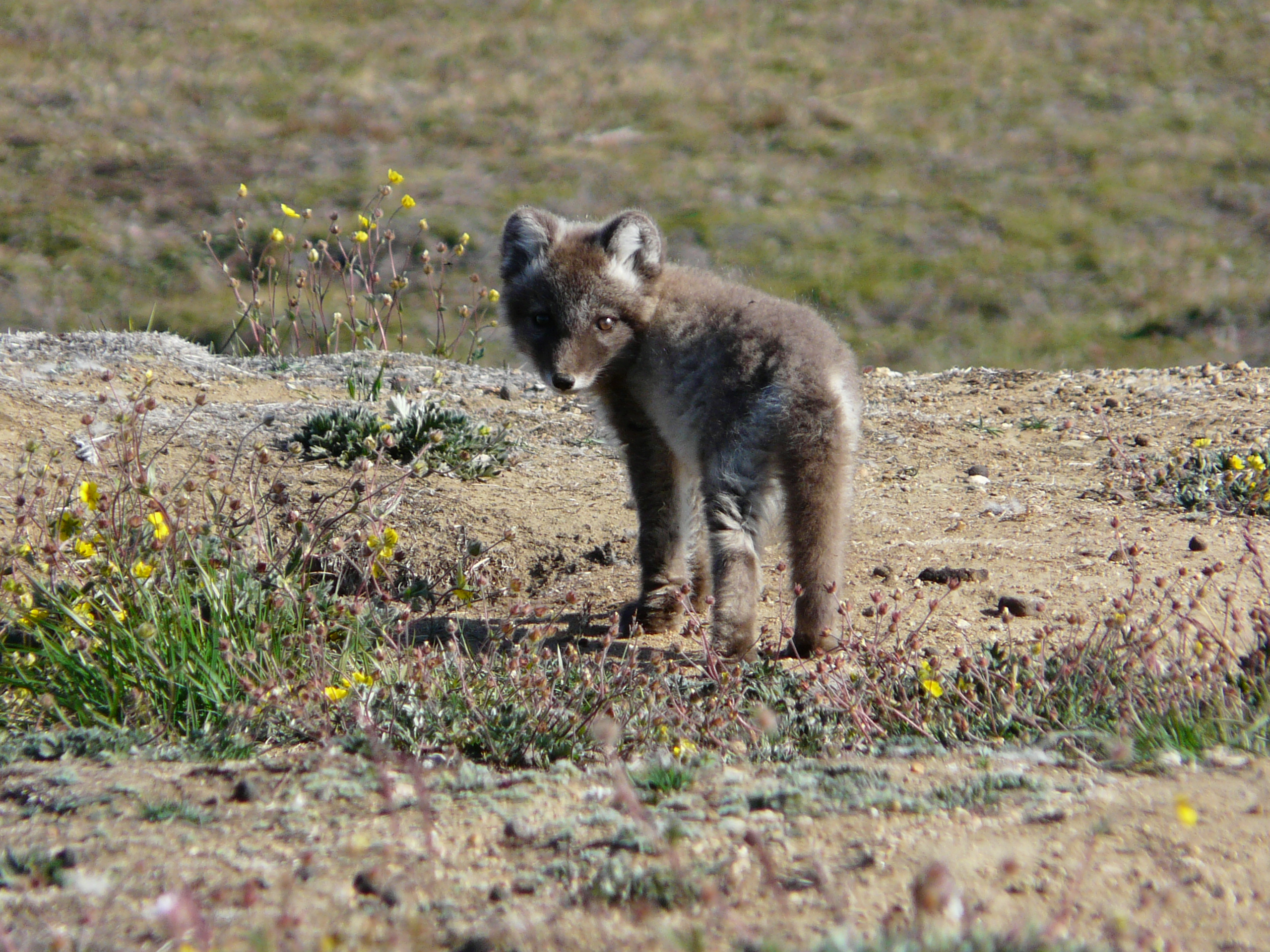
Will the Arctic fox survive in a warming climate? (Pic. I.Quaile, Greenland)
Ulterior motives
Clearly, progress to halt global warming is key to preserving the Arctic ice. That makes it all the more interesting that the Arctic Council summit in Fairbanks is being hosted by none other than the “new” US Secretary of State Rex Tillerson, as the USA has held the rotating Chairmanship of the Council for the last two years. Given that Tillerson is former CEO of the fossil fuels giant EXXON Mobil, there will be a keen interest in anything he says on or off the record, with regard to climate change and the prospect of future oil and gas drilling in the Arctic. Given that he is the first Republican Secretary of State to attend an Arctic Council summit, unsurprisingly there is much speculation about whether this indicates an increased US interest in the Arctic – and with what motives. Joel Plouffe has some interesting insights on that aspect.
The Trump administration is keen to boost Arctic drilling, hoping to benefit from easier access thanks to Arctic warming and decreasing sea ice cover. It is to be feared that this is the main reason for the upsurge in US interest in the region. The same applies to Russia.
The thing is, Lavrov didn't have to be there. The other #Arctic FMs weren't there. Just him, watching Tillerson's 2 min welcoming remarks. ? https://t.co/qeEdLGTWRg
— Heather Exner-Pirot (@ExnerPirot) May 11, 2017
Heather Exner-Poirot notes with interest that Russian foreign minister Sergei Lavrov was the only one of the Arctic foreign ministers to hear Tillerson’s speech at the reception in Fairbanks on Wednesday evening.
Cooperation – on climate science?
Finland will take over the helm of the Arctic organization at the end of today’s meeting. Finland has said it aims to protect the Arctic during its chairmanship by adhering to the Paris Agreement. Good luck Finland. You have an interesting couple of years ahead of you.
The theme of the US Chairmanship has been “One Arctic: Shared Opportunities, Challenges and Responsibilities”. The Council says this was reflected in much of the work completed by its six Working Groups and Task Forces over the last two years.
One key issue in focus is science. The “Agreement on Enhancing International Arctic Scientific Cooperation” is up for approval and signature in Fairbanks.
Since taking office, the Trump administration has taken drastic measures to cut budgets for climate science and environment protection. Not without reason did scientists takes to the streets around the world in protest. So there was a considerable feeling of relief when David Balton, the State Department’s assistant secretary for oceans and international environmental and scientific affairs and chair of the Senior Arctic Officials over the past two years announced on Monday that the US remained commited to Arctic climate change research.
“The US will remain engaged in the work the Arctic Council does on climate change throughout,” he told reporters.
“I am very confident there will be no change in that regard”.
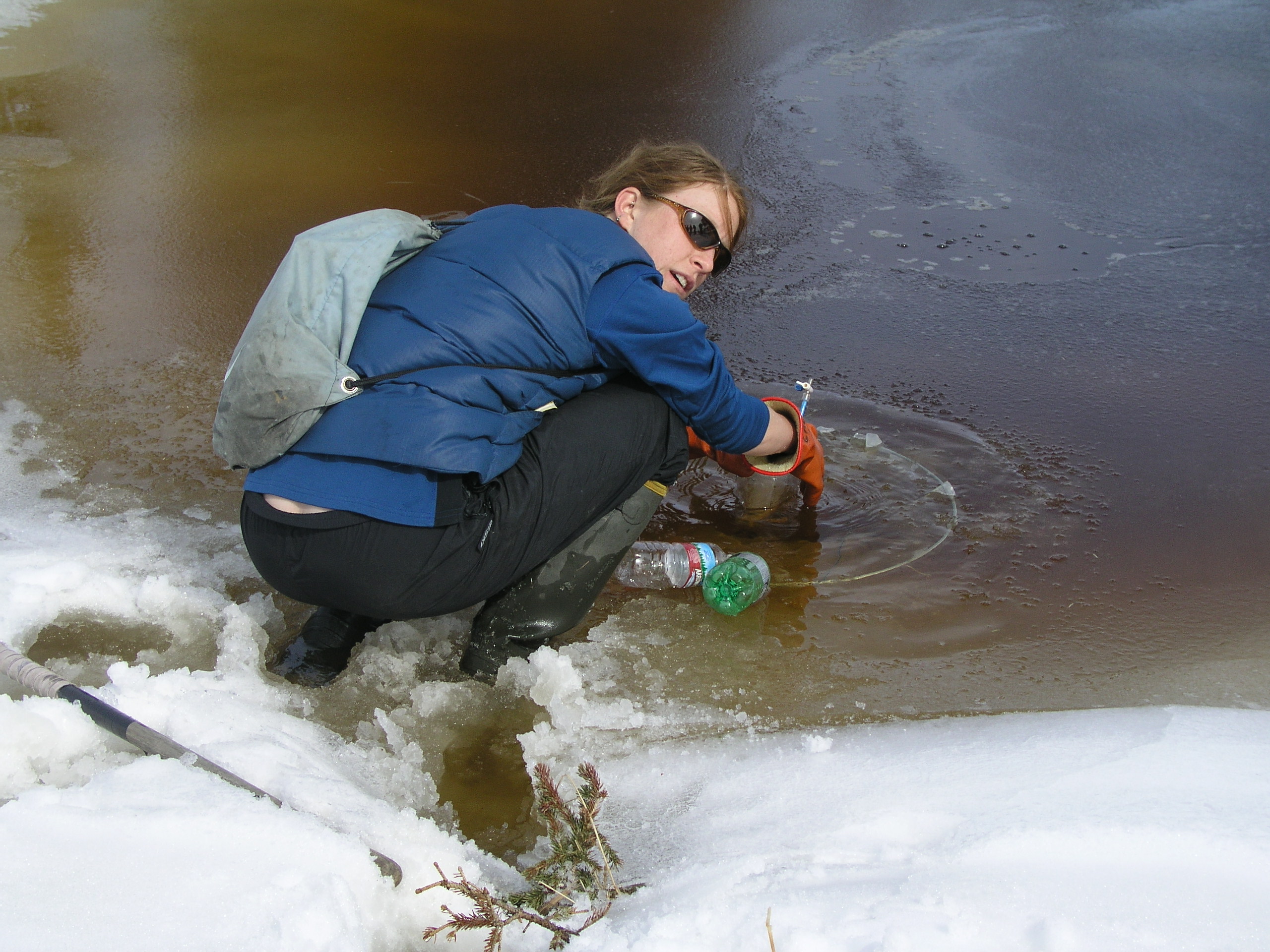
Scientific research is key. Collecting methane from melting lake in Alaska (Pic. I.Quaile)
To drill or not to drill…
It remains to be seen exactly what that will involve. It is hard to understand how Trump’s considering pulling the US out of the Paris Agreement can be reconciled with any commitment to protecting the Arctic from climate warming. It seems more likely that he is keen to benefit from the effects of climate change making the Arctic more accessible for commercial development. After all, scientific research in the Arctic can take many forms.
On April 27, the President signed an executive order aimed at rolling back restrictions on offshore drilling, including offshore Alaska. Barack Obama had issued orders closing off areas of the Arctic and Atlantic oceans to oil and gas drilling.
In the meantime, ten environmental and Alaska Native groups are suing the federal government over Trump’s new order. The groups are led by the League of Conservation Voters, Natural Resources Defense Council and Earthjustice. They say the order exceeded Trump’s authority under federal law.
In ADN, on May 3 Erica Martinson quotes Niel Lawrence, NRDC senior attorney:
“These areas have been permanently protected from the dangers of oil and gas development. President Trump may wish to undo that, and declare our coasts open for business to dirty energy companies, but he simply lacks the authority to do so under the law.”
Icy battle over future energy
While the legal wrangling continues – and the number of lawsuits involving climate change is on the increase – the Arctic continues to warm at a rapid rate.
The “Snow, Water, Ice and Permafrost in the Arctic” (SWIPA) report published in April indicates that the Arctic Ocean could be largely free of sea ice in summer in just two decades, and that projections of global sea level rise are underestimated.
The signs do not bode well for the Arctic. What happens in the region depends very largely on how fast the world is able to halt global warming. With the world’s second-biggest emitter set on exploiting the impacts of global warming in the region and reversing measures to protect environment and climate, the main question is how much influence the USA will actually have, and how resilient the transition to renewable energies will be.
Claudia Kemfert, a leading climate economist, recently published a new book in German about what she sees as the fossil fuels empire “striking back”, a campaign to discredit the green energy revolution. She warns against complacency and underestimating the influence of the fossil fuels lobby.
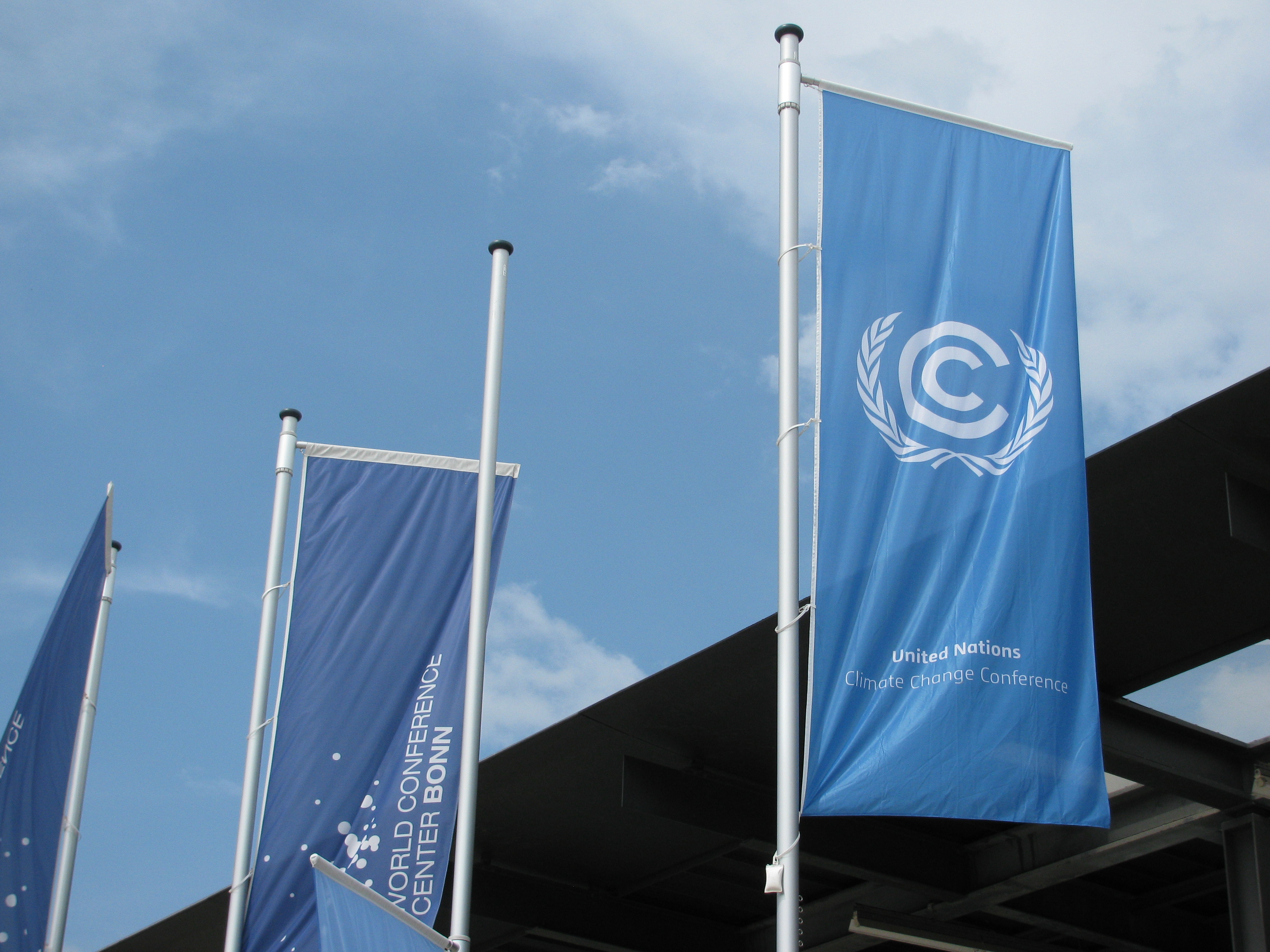
Bonn hosts the UN climate talks now and in November (Pic: I.Quaile)
At the UN talks in Bonn, the influence of those fossil fuel lobbyists on the negotiations has become a key topic of debate.
Government representatives with the common goal of achieving climate protection are not the only ones attending the talks. Alongside the environmental activists on the sidelines, lobbyists from various sectors are also there to promote their own interests. And these include industries which do not stand to profit from restrictions on emissions. All these groups are allowed to attend the international climate conferences hosted by the United Nations Framework Convention on Climate Change (UNFCCC).
Transparency needed
A recently published report from Corporate Accountability International, a United States-based nongovernmental organization, highlighted the strong power of trade and business organizations at climate-related events.
The fossil fuel industry is particularly well represented.
One group cited in the report is the National Mining Association in the US, which, the ngo notes, supports increased coal consumption and contributes to climate change.
The United States Chamber of Commerce is another regular participant. The largest lobbying group in the country – and the largest chamber of commerce in the world – is in favour of nuclear power, offshore oil production and drilling in the Arctic National Wildlife Refuge.
When it comes to the Arctic, the stakes have never been higher, politically, economically and of course environmentally.
Even the implementation of the most ambitious emissions reduction measures will not halt the increasing accessibility of the once virtually unnavigable Arctic Ocean in the near future. That guarantees that this will not be the last Arctic meeting to be attended by top-level politicians from the world’s most powerful nations. Meanwhile, the lobbyists will continue their attempts to prolong the fossil fuels era in spite of all the scientific evidence indicating the dangers it holds for the planet.
Perhaps the most important thing about Tillerson’s attendance in Fairbanks is the attention it draws to what is happening in the high north. And the UN climate process can only benefit from the transparency emerging over exactly who is advocating and influencing what in the negotiations.
Cheap oil from the Arctic? Fake news, says climate economist Kemfert
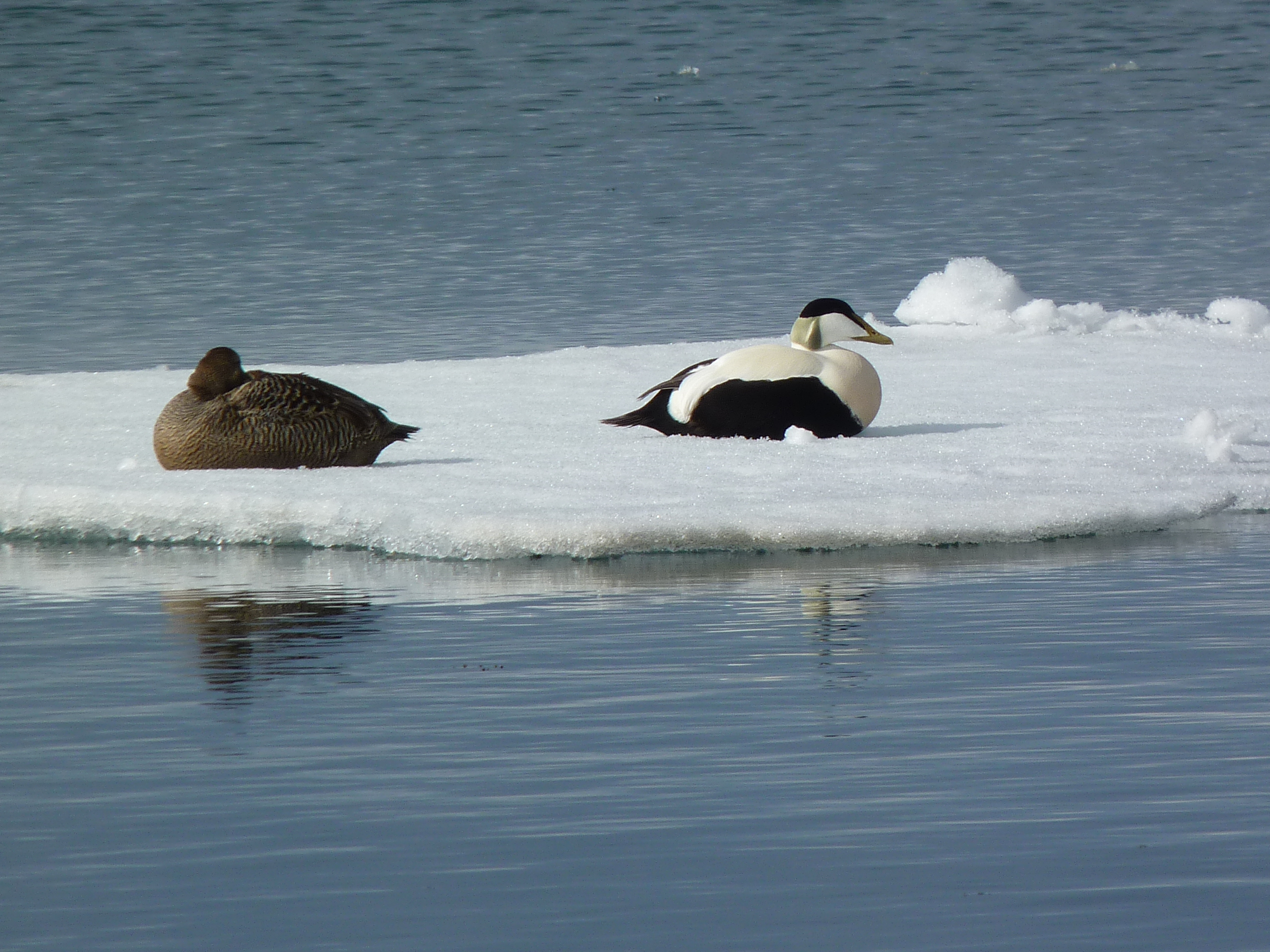
Nothing fake about melting ice. Eiders, off Svalbard (I.Quaile).
This week I came across an interesting publication about to come on to the German market.
“The fossil empire strikes back” (Das fossile Imperium schlägt zurück) is the translation of the catchy title of a new book in German by Professor Claudia Kemfert, head of the department of energy, transportation and environment at the German Institute for Economic Research in Berlin (DIW Berlin,) and professor of energy and sustainability at the Hertie School of Governance, in Berlin.
She has also acted as advisor to the German government, the European Commission and is on the steering committee of the renowned Club of Rome.
A fossil fuels revival: happening now, or alternative facts?
I called her up to record an interview for our Living Planet radio show to find out what was behind the headline, and the sub-title: “why we have to defend the “Energiewende” (energy transition) now.
Prof Kemfert believes the fossil fuels sector is really working hard at making a comeback. That, she says, is not fake news, but the fossils lobby makes use of the latter in its attempt to turn the clock back in terms of energy production.

Kemfert argues for renewables. Copyright: Neuberg, Sebastian Wiegand
While the global transition towards renewable energy has been successful in recent years, with the costs of alternative energies reduced, the Paris Agreement signed and ratified, now, she says, the fossil fuels sector is striking back.
She says they do it by spreading fake news, creating myths about restrictions on cars, speed limits, blackouts, globally, but especially in the USA under the Trump administration. So, she argues, we have to defend the energy transformation. The window of opportunity for climate action is still open, but we are losing time.
The power of fake news
Kemfert’s aim is to debunk the myths, which she is convinced are being used to give renewable energy a bad image. Some of the examples she cited to me are false claims that renewables are more expensive, or that reliance on alternative energies will mean blackouts.
“This has never happened in Germany”, she notes, the country that gave the “Energiewende” its name and pressed ahead with the transition to renewables in recent years.
So how can fake news of this kind make such an impact that Kemfert and other like-minded experts are worried about an oil and coal revival?
“If you repeat this all the time, and repeat it on social media, people think it’s true”, she told me.
“The danger is that they can be successful”.
“The global energy transition is in danger”, she is convinced. “We are losing time to bring greenhouse gases down and help the planet to survive.
“The lobby of the fossil empire is extremely strong… the whole campaign with myths and fake news is really successful, because a lot of people believe what they say”.
So are the fossil fuel lobbyists just better at getting a message across than the other side? There could be something to that, Kemfert agreed. She says the “green lobby” is not aggressive enough. People think “we are the good ones, the energy transition comes by itself”- this is not true. Now it’s time to fight for it”.

We still have a window of opportunity, says Kemfert (Pic. I.Quaile, Alaska)
Time to march?
She calls on all scientists and people who want to protect free and democratic science, to take part in the Marches for Science, planned to take place round the globe on April 22nd.
Of course I wanted to know how she thought the global counter-attack by the “fossil empire” would impact the Arctic.
Yes, she said, this push for a fossil fuels revival could provide additional motivation to those who would like to push ahead with Arctic drilling, as climate change makes for easier and less expensive access:
“There are some aggressive industries, especially coming from the oil and gas sector, who have interest to drill for oil in the Arctic region.
For them, she says, easier access thanks to climate change would be “a nice, so-to-say side effect”.
But for the planet as a whole, climate change is so dangerous that any potential short-time business benefits are just not worth thinking about, says Claudia Kemfert:
“As a climate economist, I cannot say this (oil from the Arctic) makes economic sense, because the costs of climate change are much higher than lower costs, for example, for drilling oil in the Arctic. The costs of global climate change are so high that it cannot outweigh the cost reduction of oil drilling in the Arctic when there’s low ice. We have to move away from oil and gas, this is why it’s more economically efficient to go for an energy transition instead of drilling in areas where we have climate impacts, we are causing environmental difficulties and where we know that burning these fossil fuels will create climate change. That’s really the wrong way to go”.
Kemfert’s book is only being published in German at the moment, but there is more info on her home page, and a longer version of the English interview I conducted with her will be coming up soon on Living Planet and on the DW website.
Finland courts US rivals Russia and China in bid for key role in Arctic power game

China has its own Arctic research station on Svalbard. (Pic. I.Quaile)
Finland does not often make its way onto the international news agenda, but as the country prepares to take over the presidency of the Arctic council from the USA next month, it succeeded twice over the past week. Firstly, the country’s President offered to host a meeting between Russian President Putin and US President Trump. Then Chinese President Xi Jinping flew in on a state visit on his way to a meeting with Trump.
Tackling the summit
At a forum in the northern Russian city of Arkhangelsk last Thursday entitled “The Arctic: Territory of Dialogue”, Finland said it was willing to host a high-level summit meeting during its two-year presidency and would be happy to receive the Russian and US Presidents in Finland.
In his statement, the Finnish leader stressed that “the geopolitical tensions in other parts of the world should not be allowed to spill over to the Arctic. Cool heads are needed to keep the Arctic an area of low tensions also in the future.”
Under the chairmanship slogan “Exploring Common Solutions”, he said “we want to highlight the need for constructive cooperation between all Arctic stakeholders. Also, we believe it is time to take the Arctic cooperation to a new level. Finland proposes the convening of an Arctic Summit to discuss a wide range of issues pertaining to the region and beyond. This would provide an opportunity to ensure that the Arctic indeed remains a territory of dialogue”.
Heather Exner-Pirot, Managing Editor of the Arctic Yearbook, was scathing about the Finnish move in a blog post for Eye on the Arctic. She says Finland has been floating the idea of such a summit at least since 2010.
“But after meeting with Barack Obama in May 2016, Niniistö seemed to abandon such plans, calling the timing “inappropriate” given the international political situation. That was short-lived. Niniistö once again revived the idea in his first telephone call with now President Trump, in December 2016.”

Go for the summit or work from base camp? (Greenland, Pic. I.Quaile)
Stick to base camp?
Exner-Pirot finds it “bewildering” that the current situation could be considered more appropriate than they were a year ago.
“Niniistö may not have noticed, but the Trump Presidency is in crisis, a political dumpster fire, not least because it is under investigation for inappropriate ties to Russia during its 2016 Presidential campaign. Any meeting of Trump and Putin under the current political climate would be a circus.”
She says Finland has not put forward any convincing reasons to host such a Summit, and that the usual biannual Arctic Council Ministerial, which will take place next month, is an adequate regular platform to address high level Arctic issues amongst the Arctic states’ Foreign Ministers.
“The Trump Administration has proffered no position on Arctic affairs except, tangentially, to cast doubt on the anthropogenic contributions to climate change; it is hard to imagine more sophisticated or constructive discussions arising from an Arctic Summit.”
She argues for continuing “compartmentalization” as a guiding principle in regional Arctic politics, keeping environmental issues and development “insulated from the destabilising fluctuations that occur within the broader international system.”
Cooperation with Russia is “rational and necessary”, Exner-Pirot concludes, but “inviting Trump and Putin together for an Arctic Summit flagrantly violates this strategy. Instead, it invites drama and uncertainty into Arctic politics at a time when multilateral efforts are progressing quite smoothly; an all-risk-and-no-reward scenario. This is not the Arctic way. Cooperation with Russia in the Arctic must continue. But the proposal for an Arctic Summit should be shelved.”

Easier access necessitates close cooperation to cope with more traffic in the High North (I.Quaile)
Nice try?
While there is much to be said for tackling issues at lower levels – can you blame Finland for making the most of its central role at the helm of the Arctic Council? It is surely natural for a country in this position to offer a stage for a high-profile meeting of these two world leaders – perhaps especially when it seems unlikely in the present circumstances.
At any rate, it will only happen if the two key players feel it could be to their advantage. The very prospect certainly ensured considerable news and public attention for the incomimg Arctic Council Presidency.
Finnish President Sauli Niinisto back-pedaled a little later, saying the nation was unlikely to hold an Arctic summit at short notice, cooling media excitement at the prospect of an early meeting between US President Trump and Putin.
For his part, President Putin said he was willing to meet Trump in Finland, but “he would wait longer if needed”, the news agency AP reported: “We are waiting for the situation to normalize and become more stable. And we aren’t interfering in any way.”
With a US congressional investigation of possible links between the Trump election campaign and Russia underway, the jury, presumably, can said to be “still out” on that one.
Ultimately, insulating the Arctic from the tensions of international politics as Exner-Pirot suggests, seems like wishful thinking.
There is evidence enough that Russia has been moving to increase its military presence in the region. In a feature for Reuters published January 30th, Andrew Osborn wrote Russia was “again on the march in the Arctic and building new nuclear icebreakers.”
Osborn describes this as “part of a push to firm Moscow’s hand in the High North as it vies for dominance with traditional rivals Canada, the United States and Norway as well as newcomer China.”

The Chinese lion is claiming its space in the Arctic. (Svalbard, Pic. I.Quaile)
Based on interviews with officials and military analysts and reviews of government documents, Osborn concludes that Russia’s build-up is the biggest since the fall of the Soviet Union and that it will “in some areas, give Moscow more military capabilities than the Soviet Union once had.”
He continues “under President Vladimir Putin, Moscow is rushing to re-open abandoned soviet military, air and radar bases on remote Arctic islands and to build new ones, as it pushes ahead with a claim to almost half a million square miles of the Arctic.”
The article was written after a tour of the Lenin, a Russian icebreaker now functioning as a museum in Murmansk. This week that name popped up again in a story in the Barents Observer by Thomas Nilsen entitled “FSB fears terror at nuclear installations in Murmansk region”.
The topic was on the agenda at a conference on board that same museum icebreaker in Murmansk the day after the metro attack in St. Petersburg.
The conference was entitled “Improving antiterrorist protection of civilian and military nuclear power facilities, preventing acts of nuclear terrorism”.
Nilsen points out that there are few places in the world with more operational nuclear reactors than the Murmansk region.
So is there a link between the Arctic and possible terrorist attacks by “Islamic State”, suspected by Moscow of being behind the St. Petersburg attacks?
Nilsen quotes Oleg Gerasin, head of the Russian intelligence bureau FSB in Murmansk region, explaining that ships from Russia’s Northern Fleet have been taking part in “antiterrorist operations in Syria.”
This demonstrates once more the inter-connectedness of the world today. With all due respect for essential multilateral cooperation on a wide range of issues at lower levels, across the board, ultimately the nature of politics in a globalized world can necessitate participation at the highest leadership level and lend symbolic significance to top-level summits. And that can apply especially if they can be brought about in times of strained relations and global risks.

The view from above can be useful (Greenland, Pic. I.Quaile)
Chinese ties
This week also saw Chinese leader Xi Jinping pay a visit to Helsinki, on the way to his tensely awaited meeting with US President Trump. This was only the second ever visit to Finland by a Chinese leader, although Xi himself visited in 2010 when he was vice-president. Niinistö made an official visit to China in 2013 .
Finland opened political ties with China in 1950 and Chinese state media were keen to stress that Finland was the first western country to sign a governmental bilateral trade agreement with Beijing.
Xi said in a statement there was “great potential” for future bilateral trade ties. He stressed that “over the past 67 years of diplomatic ties, the China-Finland relationship has enjoyed steady and sound growth despite the changing international landscape”. China is Finland’s fifth largest trading partner and Xi said he saw “great space and potential for further economic cooperation and trade”.
During the visit, Finland became the latest to benefit from what the news agency AFT describes as “Beijings famed panda diplomacy”. A pair of giant pandas will be leased to Ahtari zoo in central Finland, where a new panda cage costing more than eight million euros is being constructed.
So while President Trump warned talks with Xi would be “very difficult” – the US deficit with China rose to 31.7 billion $US in February – Finland was stepping up its game, cultivating non-Arctic nation China. China has observer status at the Arctic Council and a strong economic interest in making use of shorter sea routes from Asia to Europe and the USA through the Arctic, with climate change making access easier, although relatively high transit costs and unpredictable ice cover still limit its attractiveness. Beijing is keen to gain footholds in a region it sees as key for the future.
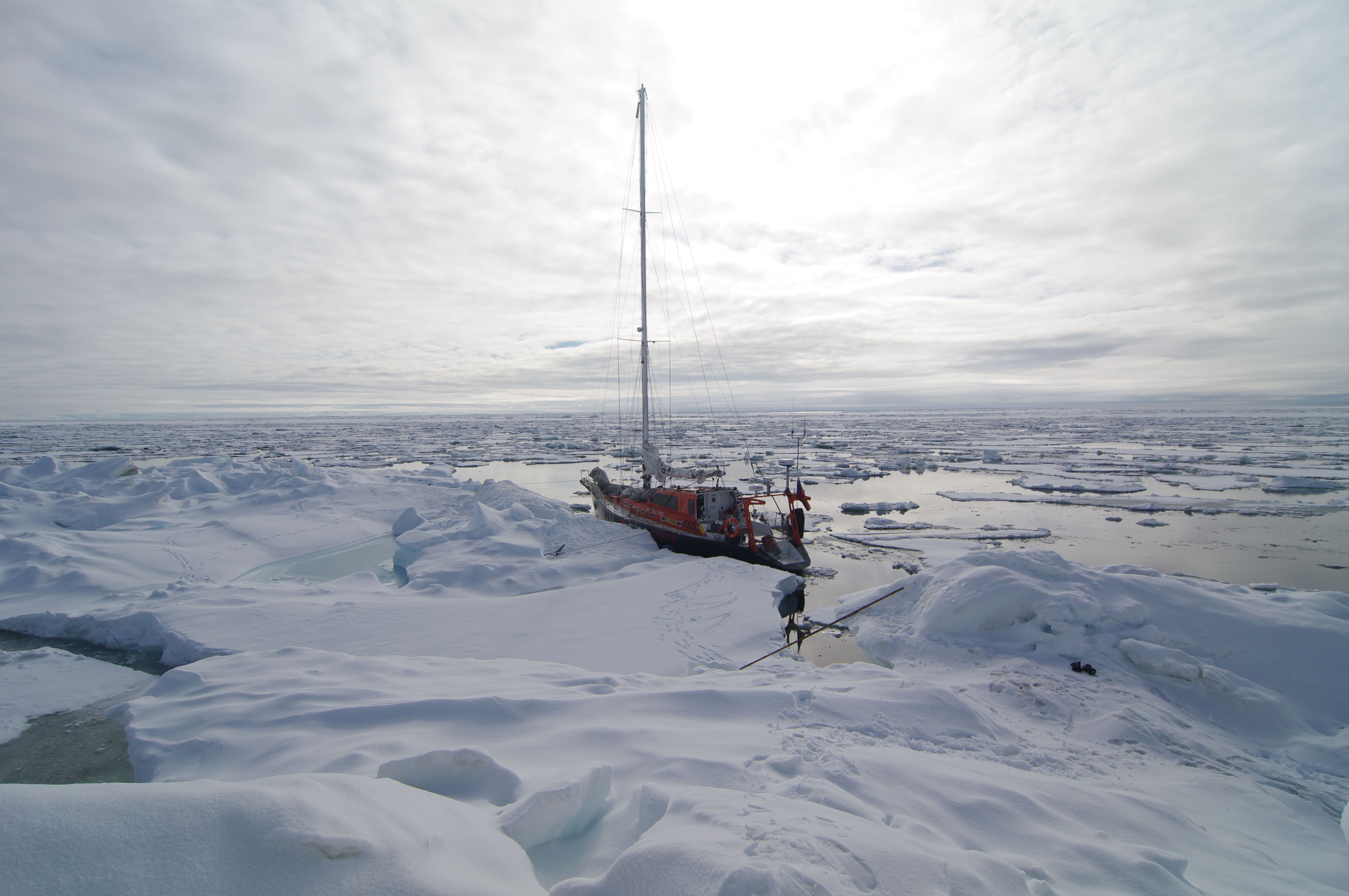
The Russian Peter 1 was the first sailing boat to cross the North Pole unaided in 2010 http://www.rusarc.ru/
China is starting to build its own icebreakers. New icebreakers could allow year-round navigation in the 2020s, Grigory Stratiy, deputy governor of Murmansk Region told Reuters.
China is leading a “Belt and Road Initiative” (BRI), a $5trillion plan to upgrade infrastructure between Asia and Europe. So far, Russia is the only one of the eight Arctic nation states to be a BRI partner. China, which has partnered heavily with Iceland in recent years, is keen to get the Nordic nations on board.
In the statement issued after the visit, China and Finland stressed two key over-arching issues:
“Both sides are committed to working together to reduce or limit greenhouse gas emissions, promote sustainable development and strengthen climate change adaptation and mitigation efforts.”
The two partners “shared the view that economic activities in the Arctic area should take into full consideration the protection and sustainable use of its natural resources. The two countries will intensify economic and technological cooperation in the fields of arctic marine industry, arctic geology, marine and polar research (including polar weather and sea ice monitoring and forecast), environmental protection technology, shipping and maritime safety, including vessel monitoring and reporting, ICT and tourism.”
A wide-ranging and ambitious spectrum.
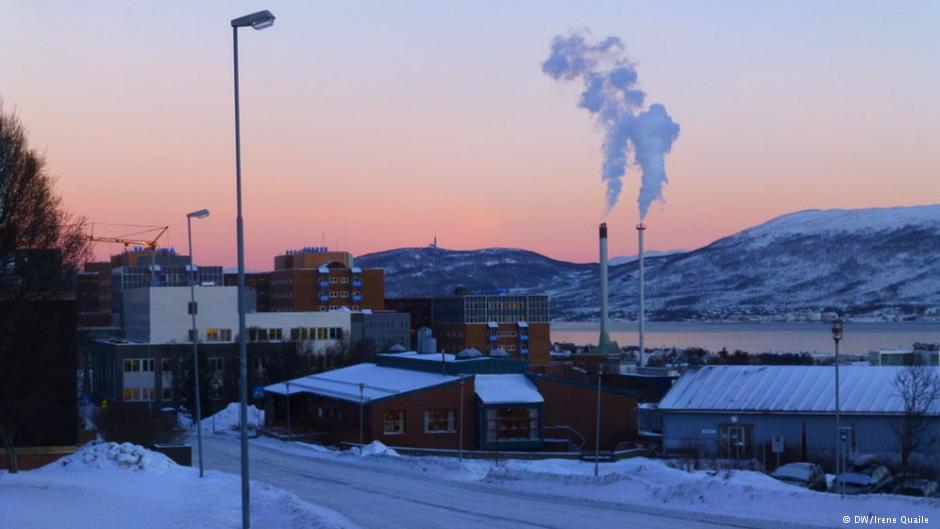
Get rid of those emissions (Arctic Tromsö, Pic. I.Quaile)
Meanwhile, on the global climate action stage, China seems set to benefit from the backward-looking policies of the Trump administration, positioning itself as a new world leader. At home pollution, drought and desertification are causing increasing problems for Beijing. To ensure peace and food security and avert unrest, a switch to renewable energies is essential. Beijing has also recognized their economic potential. At the same time the country can polish up its international image by taking on the role of climate leader while Donald Trump advances to environment and climate public enemy number one.
While it leads the global move to halt climate change, China is positioning itself to exploit the impacts global warming has already had on the Arctic. Given the current state of the global climate and the slow progress towards keeping to the two-degree let alone 1.5 degree upper limit for global warming, the Arctic is unlikely to re-freeze in the near future. Full speed ahead for Arctic development?
The Arctic Council has to be the body that controls what is happening in the High North and coordinates protection of the fragile Arctic environment.
As President of the body for the next two years, Finland has the opportunity – and the responsibility – to make its influence felt.
As far as the first meeting between the Russian and US-American “big men” is concerned, Finland just might have to pass. Finnish leader Niinistö had to admit to a news conference:
“The G20 meeting in Germany will likely be the first meeting for presidents Trump and Putin”, (July 7 and 8.)
Watch this space.




















Feedback